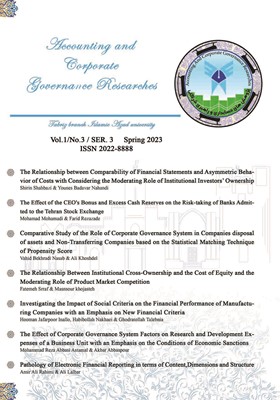A Comparative Study of the Role of Corporate Governance in Divestiture Companies and Non- Divestiture Companies on Based score matching Statistical Approach
Subject Areas : Corporate governance
Vahid Bekhradi Nasab
1
*
![]() ,
Ali Khoshdel
2
,
Ali Khoshdel
2
1 - Department of Accounting, Najafabad branch, Islamic Azad Univercity, Najafabad, Iran
2 - PhD student, Department of Accounting, Tehran Branch, Islamic Azad University, Tehran, Iran.
Keywords: Corporate Governance, propensity score matching, Divestitures,
Abstract :
Divestitures have the potential to create shareholder value by helping firms optimize their portfolio of assets. Even so, firms do not necessarily take up divestitures because of agency problems. In fact, large controlling shareholders may prefer to extract private benefits of control at the expense of minority shareholders. In addition, divestitures may expose the misappropriation of corporate resources. In this paper, we explore the role that other blockholders play in constraining the largest shareholder’s influence. The study statistical population is the companies listed in Tehran Stock Exchange. Sample was determined by systematic elimination method and 183 observation (company-year) by systematic knockout method during the period of 2009 - 2022 to examine the hypothesis test. The research method is based on the Propensity score matching (PSM) statistical technique and the software used to implement this method is Oxmetrics 6 software, Stata12 software and Eviews8 software. The results indicate that divestiture activity decreases with the ownership of the largest shareholder, which imposes a cost to minority shareholders since the firm’s value is not maximized. The presence of another significant blockholder appears to curb this negative bias towards divestitures. This finding provides an economic rationale for the higher performance of firms characterized by more balanced ownership structures. Involvement of family owners also appears to provide similar benefits.
_||_

